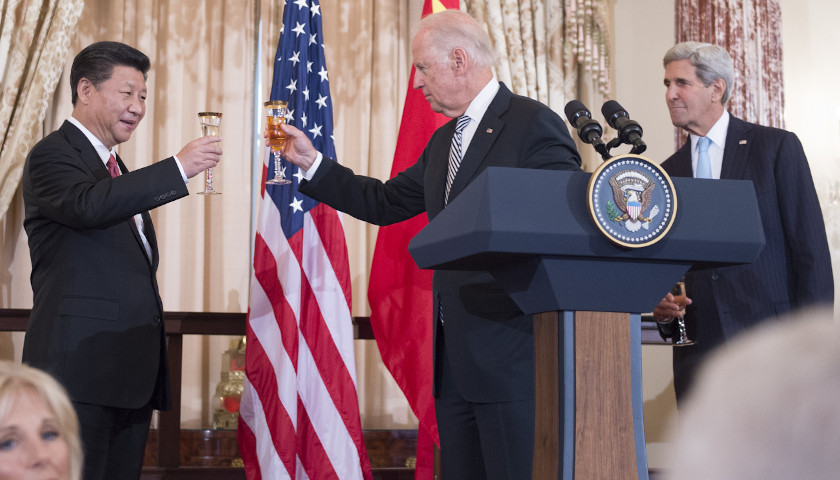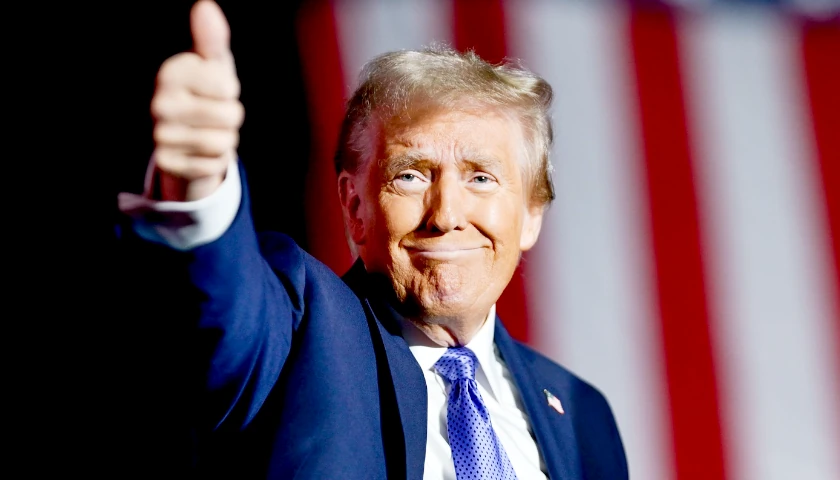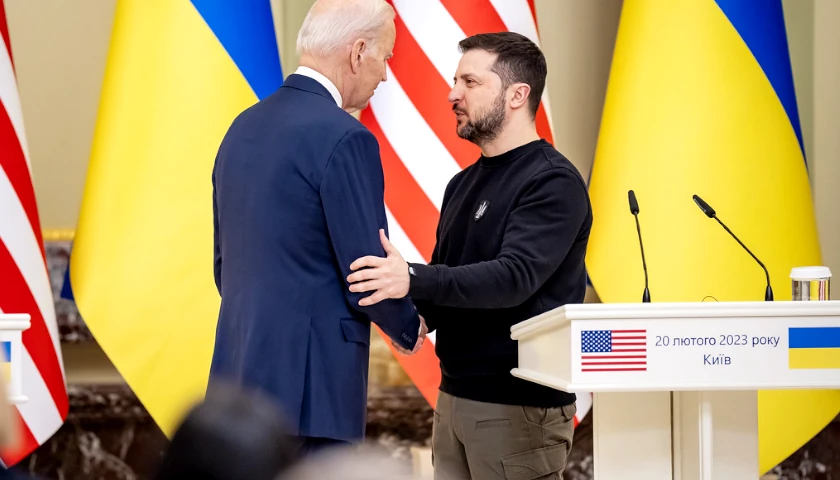The New York Times on Monday published a 3,100-word story headlined “Joe Biden’s China Journey.” The three reporters whose bylines appear on the article engage in a painfully obvious effort to explain away the former vice president’s long and cozy relationship with communist China. Now, at long last, they suggest, Biden is ready to get really tough on China. Tougher even than Trump.
Good luck to them selling that fractured fairy tale.
Biden has appeased China and advanced its interests for as long as I’ve been paying attention to China policy, which is to say since shortly after the Democratic presidential nominee arrived in Washington, D.C., nearly a half-century ago and I arrived in Hong Kong with the Seventh Fleet. American workers have paid a heavy price for the combination of naïveté and greed that has driven Biden’s views about China over the decades. The naïveté came first, of course. The greed came later.
In the 1990s, Biden pushed for and voted repeatedly to protect China’s “most-favored-nation” trade status, which ensured that cheap Chinese-made goods would flood America’s big-box stores. Even worse, he championed China’s entry into the World Trade Organization under terms that heavily favored the Communist giant. This blunder cost the United States 60,000 factories and 3.5 million jobs.
Biden did all this despite admitting that China had a “reprehensible” record on human rights and “unfair trade practices.” But with lifelong politicians, you have to look beyond the rhetoric to see what they actually do. Biden’s actions with regard to Beijing invariably have benefited China and, in more recent years, his family.
The one exception to Biden’s “Made in China” agenda would seem to be his advocacy of Radio Free Asia. Biden’s defenders invariably claim that he was instrumental in establishing a federally funded news media network to promote democratic values within China. One of his Senate Foreign Relations Committee aides at the time, James P. Rubin, told the Times that Biden worked so hard to set up RFA because he realized China was a “brutal system” after the 1989 crackdown against protesters around Tiananmen Square.
Not all of those who worked with Biden at the time, however, were impressed in the same way with Biden’s supposed change of heart. I served as a commissioner on the Presidential-Executive Commission on Broadcasting to the PRC in the early ’90s alongside two commissioners handpicked by Biden. Both fought against the establishment of RFA every step of the way and, in the end, both voted against it. When those of us on the other side later met with Biden to try and shore up his support for RFA, he tried to laugh off the defection of his two commissioners, talking about his personal support for the project. If there were godfathers of Radio Free Asia, which finally won approval in 1994, they were Senators Jesse Helms (R-N.C.) and John McCain (R-Ariz.), not Joe Biden.
Then there was the September 2000 debate over whether or not to grant permanent most-favored-nation status to China. Those of us opposed to the idea argued that the annual U.S. review of China’s trade status gave Washington the leverage it needed to help rein in China’s bad behavior at home and abroad. Biden, however, voted to grant permanent most-favored-nation status to China. He went on to support China’s accession to the World Trade Organization as well.
A Quarter-Century of Capitulation
Biden early on fell for the myth that China’s rise was not only inevitable but that the United States should welcome it. In fact, he has spent most of the past quarter-century attempting to sell Americans on the idea that “a rising China is an incredibly positive development for not only China but for the U.S. and the rest of the world.”
As vice president, Biden’s efforts to enable China’s rise accelerated. In May 2013 he helped engineer a “memorandum of understanding” with the PRC exempting Chinese corporations from U.S. securities statutes and regulations. This meant that the Chinese Communist Party could raise trillions from our debt and equity markets on preferential terms, giving them an advantage over American firms. Among other things, this MOU exempted Chinese companies listed in U.S. stock exchanges from independent audits, allowing them to continue to cook their books while raising billions from unsuspecting U.S. investors.
On the human rights front, the then-vice president was largely missing in action. When he did speak out in public it was often to soft-pedal CCP abuses, as when he said on a visit to China that he “understood” the need for the brutal one-child policy.
Biden’s record on Asian security issues is equally unimpressive. As Barack Obama’s vice president, he was nominally in charge of the “Pivot to Asia,” which was intended to reassure our allies in the region by countering China’s continuing military buildup. Yet as China militarized the South China Sea and bullied smaller neighbors such as the Philippines and Vietnam into accepting its claims, Biden’s response was lackadaisical. By the time he left office, we had added exactly one warship to the Seventh Fleet.
You may decide for yourself why he took his son, Hunter, to Beijing in December 2013 on Air Force Two while he was vice president. It is at least curious that Biden did not publicly bring up China’s aggressive “Air Defense Identification Zones” and territorial claims in the South China Sea, or its massive violations of human rights while he was there.
Part of the reason for Biden’s silence may have come 10 days later, when Rosemont Seneca Partners, Hunter Biden’s boutique investment firm, landed a $1 billion dollar deal with the Chinese government, later increased to $1.5 billion. Hunter also joined the board of directors of a Chinese company called BHR, which started buying up American firms that possessed dual-use technology of interest to the Chinese military and its modernization efforts.
Willfully Blind to the Threat
Since leaving office, even as the danger that China poses to the United States and the world has become ever more apparent, the former vice president has continued his apology tour on behalf of the PRC. Biden repeatedly has dismissed China’s threat to American national security and jobs, claiming as recently as 2019 that they’re not bad and not competition. The truth is that the CCP poses a mortal threat to America in more ways than one.
Given the myriad ways that China has harmed U.S. businesses and workers—intellectual property theft, forced technology transfer, currency manipulation, dumping below-cost, predatory pricing by state-owned or controlled enterprises, and the widespread use of slave labor—fewer and fewer people outside of China regard its rise as anything but a disaster for America and the world. More and more people understand that China is carrying out what it calls “unrestricted warfare” against the United States across all domains except the kinetic.
Yet the Democrats’ nominee for president has not yet grasped this fact. He does not yet understand that Beijing steals our jobs, our technology, and sickens the world not just to supercharge its own rise, but in order to bring about America’s defeat. He still claims “China is not our enemy.”
Why else would Biden suggest that he may end President Trump’s tariffs on China without getting anything in return for the United States? Why else would Biden not hold Communist China accountable for unleashing the coronavirus on the world but instead—absurdly—is attempting to blame Trump for the outbreak? And why would his brief “Build Back Better” economic plan not even mention the name of the country that over the past two decades, in effect, has carpet-bombed the American industrial heartland with its ruthless and predatory policies?
Biden’s benign view of China is such that he still imagines that we can make common cause with an expansionist Communist empire that wants to replace us as the dominant power on the planet. He points to climate change, nonproliferation, and health security as areas of potential cooperation.
All three of these tired tropes are long past their sell-by dates. Biden may be determined to shut down every last coal-fired power plant in the United States in the name of curbing climate change, but China is just as determined to keep building them, opening a new plant every two weeks or so. What is there to discuss?
Working with China on nuclear and missile nonproliferation agreements almost sounds like a serious policy proposal, until you realize that Beijing is probably the worst proliferator of both in the world today. Pakistan, North Korea, and Iran are among the known beneficiaries of China’s assistance.
Biden’s plan to work with China on “health security,” on the other hand, sounds like a Babylon Bee parody, given that China deliberately unleashed a deadly coronavirus on the world and continues to lie about it. Yet Biden is so determined to blame Trump for all the “pain and suffering” caused by the Chinese virus that he actually absolved China of any responsibility.
A Hopelessly Compromised Candidate
As we approach the November election, Biden finally has begun cautiously denouncing China as a “dictatorship.” This is like calling a Category 5 hurricane a “summer breeze.” The high-tech tyranny that dominates the Chinese people—and dreams of extending its writ to the entire world—is like no other adversary the United States has ever encountered.
The Chinese Communist Party, like all Communist parties, is a war party. It is organized along military lines and is inherently expansionist. Its leaders have long understood that there are irreconcilable differences between China and the United States, between “socialism with Chinese characteristics” and free-market democracy, and between the current U.S.-dominated international order and the Sinocentric one that Beijing hopes will replace it.
This means that there is no win-win scenario involving democratic America and Communist China. There are only temporary truces. The new Cold War between the United States and China is a zero-sum game, which will only be resolved when one system decisively triumphs over the other.
President Trump, post-pandemic, now understands this. Biden does not and indeed—for reasons involving both Hunter’s business dealings and the left-wing of his party—cannot. Instead, he obviously is trying to navigate through the current tensions with China with the goal of restoring the old status quo—the one that heavily favored China, not to mention the Biden family fortunes.
Few were surprised when National Counterintelligence and Security Center Director William Evanina issued a statement in August saying China was working to help Biden win in November.
The former vice president tried to laugh away the report. But the threat posed by China is no laughing matter, especially if a candidate as compromised as Biden actually wins the presidency.
– – –
Steven W. Mosher is the President of the Population Research Institute and the author of Bully of Asia: Why China’s Dream is the New Threat to World Order.





